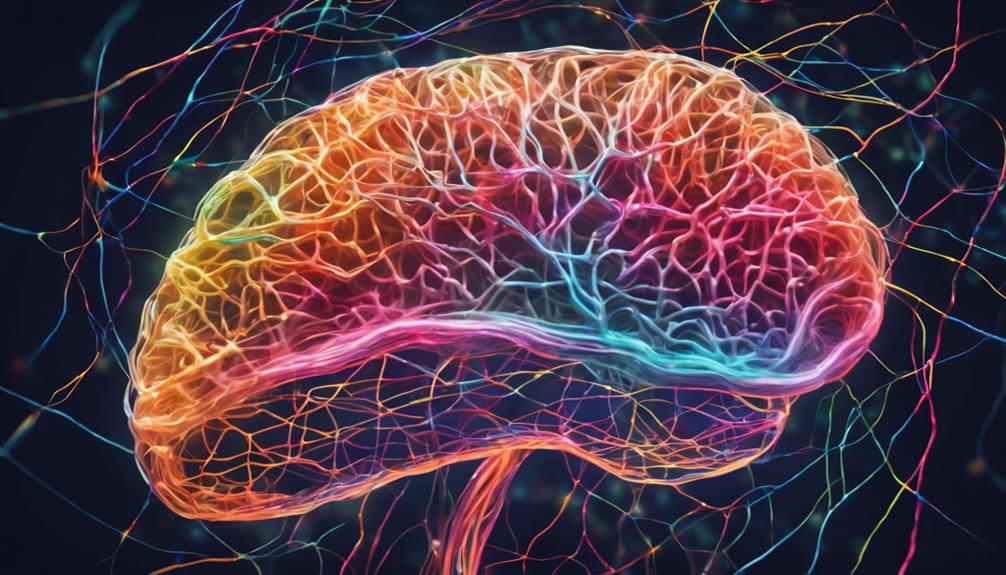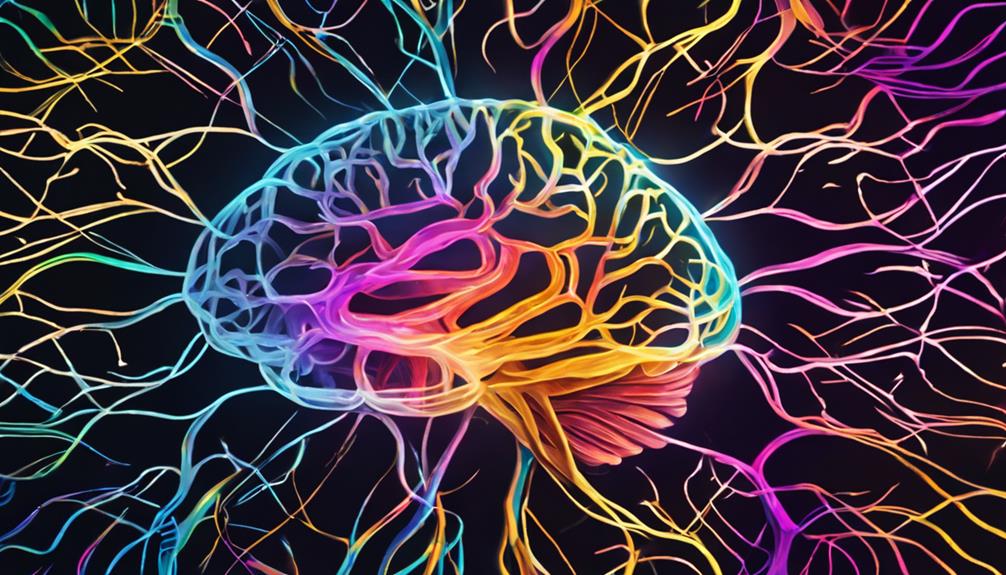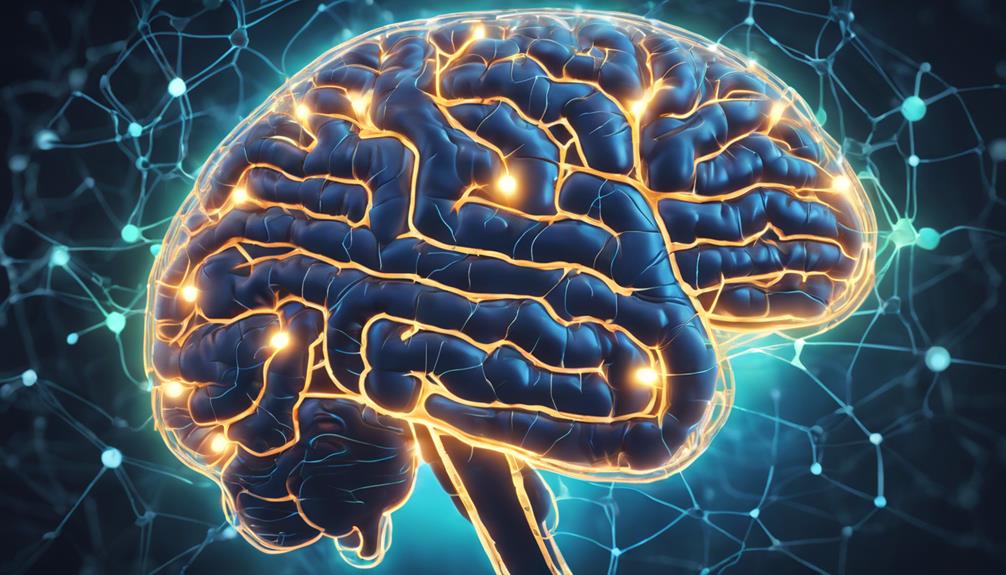Understanding the intricate relationship between hypnotic states and brain function reveals neural mechanisms and altered consciousness states. Cognitive processes significantly influence perception, attention, memory, and reasoning during hypnosis. Brain imaging studies highlight changes in attention, perception, and self-awareness regions. Altered consciousness in hypnosis involves neural mechanisms and cognitive processes, affecting perception, suggestibility, and attention. Delving into neural pathways activated during hypnosis provides insights into the brain regions contributing to altered consciousness. Neurotransmitters like dopamine and serotonin play a vital role in influencing the depth of hypnosis experience. Exploring these avenues can enhance the effectiveness of hypnotherapy sessions.
Hypnotic State and Brain Function

Navigating the intricate relationship between the hypnotic state and brain function involves delving into the complex interplay of neural mechanisms that underlie altered states of consciousness. In understanding this relationship, it is crucial to examine how cognitive processes and brain activity interact during hypnosis.
Cognitive processes play a fundamental role in shaping the hypnotic experience. Studies have shown that during hypnosis, there is a shift in attention, with individuals becoming more focused on the hypnotic suggestions while filtering out external stimuli. This altered cognitive focus influences perception, memory, and reasoning, highlighting the impact of cognitive processes on the hypnotic state.
Concurrently, brain activity during hypnosis reveals fascinating insights into the neural correlates of altered consciousness. Functional magnetic resonance imaging (fMRI) studies have indicated changes in brain regions involved in attention, perception, and self-awareness during hypnotic states. These findings underscore the intricate neural mechanisms at play during hypnosis, shedding light on the neural underpinnings of altered states of consciousness.
Altered Consciousness in Hypnosis
The examination of altered consciousness in hypnosis involves a detailed analysis of the neural mechanisms and cognitive processes that contribute to the experience of individuals under hypnotic states.
In hypnosis, individuals may exhibit altered perception, where their sensory experiences are modified, leading to changes in how they interpret and respond to stimuli. This altered perception is often accompanied by changes in cognitive functions, such as heightened suggestibility and focused attention, which can influence the individual's thought processes and behavior.
Moreover, hypnosis also involves subconscious processing, where information is processed without the individual's conscious awareness. This subconscious processing may facilitate memory recall, allowing individuals to access and retrieve memories that are typically inaccessible under normal waking conditions.
The interplay between altered perception, cognitive functions, subconscious processing, and memory recall showcases the complex nature of consciousness during hypnosis and highlights the intricate neural pathways that underlie these phenomena.
Understanding these processes can provide valuable insights into the mechanisms through which hypnosis exerts its effects on the brain and behavior.
Neural Pathways Under Hypnosis

Exploring the neural pathways activated during hypnosis offers insights into the intricate network of brain regions involved in mediating altered states of consciousness. Neural plasticity, the brain's ability to reorganize by forming new neural connections, plays a crucial role in understanding how hypnosis impacts the brain.
During hypnosis, various brain regions communicate in unique ways, leading to changes in neural pathways and connections. This process involves the concept of brain rewiring, where repeated engagement in hypnosis can strengthen specific neural pathways associated with suggestibility, attention, and perception.
Studies utilizing neuroimaging techniques, such as functional magnetic resonance imaging (fMRI), have shown that hypnosis can modulate activity in brain regions related to attention, memory, and self-awareness. These changes are indicative of the brain's adaptability and response to hypnotic suggestions.
Furthermore, the phenomenon of brain rewiring under hypnosis highlights the dynamic nature of neural networks and their capacity for reorganization in response to external stimuli. Understanding the neural pathways engaged during hypnosis provides valuable insights into the neurobiological mechanisms underlying altered states of consciousness.
Impact of Hypnosis on Brain Waves
Research has shown that hypnosis exerts a notable influence on the modulation of brain wave activity. When individuals undergo hypnotic induction, there are observable changes in EEG patterns, reflecting alterations in brain function. One significant effect of hypnosis is the enhancement of brainwave synchronization, where different regions of the brain begin to work more cohesively. This synchronization can lead to improved cognitive performance and heightened focus.
Electroencephalography (EEG) studies have indicated that during hypnosis, there is an increase in alpha brain waves, which are associated with a relaxed and focused state of mind. This shift in brain wave activity suggests that hypnosis may facilitate a state of heightened suggestibility and receptiveness to therapeutic suggestions.
Moreover, hypnosis has been found to influence theta brain waves, which are linked to deep relaxation and creativity. By altering these EEG patterns, hypnosis can potentially unlock subconscious processes and promote mental imagery, leading to a deeper level of trance and responsiveness to hypnotic interventions.
Neurotransmitters and Hypnotic Response

Neurotransmitters play a crucial role in mediating the physiological responses associated with the hypnotic experience. The balance of neurotransmitters in the brain influences the depth of hypnosis achieved by an individual. Dopamine levels, in particular, have been linked to suggestibility during hypnosis. Studies have shown that individuals with higher dopamine levels tend to be more responsive to hypnotic suggestions, entering deeper states of hypnosis more easily.
The intricate interplay of neurotransmitters such as dopamine, serotonin, and gamma-aminobutyric acid (GABA) modulates the hypnotic response. Dopamine, known for its role in reward-motivated behavior, affects attention, motivation, and reinforcement learning, all of which are integral to the hypnotic process. Moreover, serotonin and GABA help regulate mood, anxiety levels, and relaxation, which can significantly impact the receptiveness to hypnosis.
Understanding the influence of neurotransmitter balance on hypnotic depth and suggestibility can aid in tailoring hypnotic interventions to individuals based on their neurochemical profiles, optimizing the efficacy of hypnotherapy sessions.
Neuroplasticity in Hypnotic States
The phenomenon of neuroplasticity within hypnotic states underscores the brain's capacity to reorganize and adapt in response to hypnotic suggestions and experiences. Brain plasticity, the ability of the brain to restructure itself by forming new neural connections, plays a crucial role in shaping cognitive changes during hypnosis.
Research suggests that hypnotic states can induce alterations in neural pathways, leading to modifications in perception, behavior, and cognition.
During hypnosis, the brain exhibits increased plasticity, making it more receptive to suggestions and more amenable to change. This heightened neuroplasticity allows for the creation of new neural pathways or the strengthening of existing ones, facilitating the integration of hypnotic interventions and the consolidation of therapeutic outcomes.
Cognitive changes observed in hypnotic states, such as enhanced focus, suggestibility, and altered perceptions, are closely linked to the brain's adaptive plasticity mechanisms.
Understanding the interplay between brain plasticity and cognitive changes in hypnosis provides valuable insights into the mechanisms underlying hypnotic phenomena and offers new possibilities for utilizing hypnosis as a tool for cognitive enhancement and therapeutic interventions.
Frequently Asked Questions
Can Hypnosis Cure Neurological Disorders Like Epilepsy or Parkinson's Disease?
Hypnosis is not a cure for neurological disorders like epilepsy or Parkinson's disease. While some studies suggest it may assist in symptom management, the treatment effectiveness is inconclusive. Medical and ethical considerations warrant exploring alternative therapies.
Is It Possible to Get Stuck in a Hypnotic State?
Being stuck in a hypnotic trance is a rare occurrence with potential safety concerns. The duration of a hypnotic state varies but should be carefully monitored to avoid risks. Professional guidance and proper induction techniques can mitigate this issue.
Can Hypnosis Enhance Memory and Cognitive Function?
Hypnosis has shown potential in enhancing memory and cognitive performance by influencing brain function. Research suggests that hypnosis benefits may include improved focus, information retention, and overall cognitive abilities, although further studies are needed to fully understand its mechanisms.
Are There Any Risks of Long-Term Brain Changes From Hypnosis?
Long-term brain changes from hypnosis raise concerns about safety and the potential impact on brain plasticity. Research exploring the lasting effects of hypnosis on cognitive function and memory is crucial for understanding its implications.
How Does Age Affect the Brain's Response to Hypnosis?
Age can impact the brain's response to hypnosis due to changes in brain plasticity and cognitive decline. Older individuals may exhibit reduced neuroplasticity, potentially affecting the depth and effectiveness of hypnotic interventions. Understanding these dynamics is crucial in therapeutic applications.
Conclusion
In conclusion, navigating neurological changes in hypnosis requires an understanding of the hypnotic state's impact on brain function, altered consciousness, neural pathways, brain waves, neurotransmitters, and neuroplasticity.
By delving into the intricate mechanisms at play during hypnosis, researchers can gain insights into how the brain responds to this altered state of consciousness.
Further studies in this field may shed light on the potential therapeutic applications of hypnosis for various neurological conditions.


